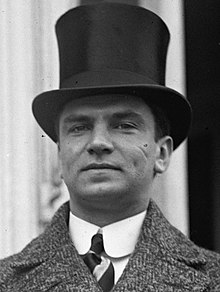Zlatko Baloković
| Zlatko Baloković | |
|---|---|

Zlatko Baloković in 1925
|
|
| Background information | |
| Born |
March 21, 1895 Zagreb, Croatia, Austria-Hungary |
| Died | March 29, 1965 (aged 70) Venice, Italy |
| Occupation(s) | Violinist |
| Instruments | Violin |
Zlatko Baloković (March 21, 1895 – March 29, 1965) was a Croatian violinist.
He was born in Zagreb, Croatia (at the time part of Austria-Hungary), and began violin lessons at age ten. He made such progress that, after three years, he was sent to Prague to continue his studies at the "Meisterschule" under the guidance of Otakar Ševčík. In 1913, already excellent and renowned, the invitation came to him to play with the Moscow Philharmonic Orchestra. That year he won the annual Austrian "Staatspreis" and soon made artistic tours to Berlin, Vienna, and Genova. He stayed in Trieste during World War I. After living in Britain from 1920 to 1923, he accepted an offer for an American tour, so on January 1, 1924, he left for New York City. In the same year, he settled permanently in the United States. In 1926, he married Joyce Borden, heiress to the Borden family fortune. In the 1920s and 1930s, the couple toured the European continent, performing predominantly for the continent's royalty.
Upon the outbreak of World War II, he settled at Hillside Farm in Camden, Maine, where he became involved in many wartime political efforts and chaired six organizations: the Yugoslav Division of the U.S. Treasury War Bond Drives; the Russian War Relief's Nationalities Division, the United Committee of South Slavic Americans; the American Slav Congress of Greater New York; the American Croatian Congress, and the American Committee for Yugoslav Relief (with Eleanor Roosevelt as the president). He advocated Tito's Yugoslav cause. In November 1944, aided by Adlai Stevenson (his nephew by marriage), he went to Washington, D.C. to demand the shipment of medical supplies to the resistance forces. After seeing President Franklin . Roosevelt, Vice President Henry A. Wallace, United States Secretary of State Edward Stettinius, Jr., Assistant Secretary of War John J. McCloy and Admiral Land, the deal was done and the requested supplies soon reached their destination.
...
Wikipedia
